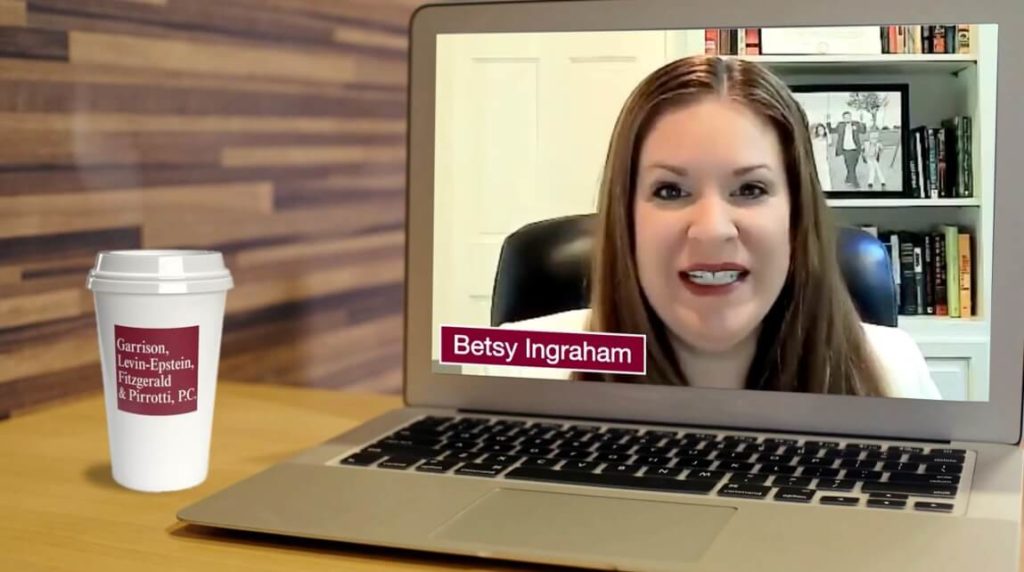Betsy Ingraham: Hello. My name is Betsy Ingraham. I’m an attorney at the law firm of Garrison, Levin-Epstein, Fitzgerald & Pirrotti, and today, we’re going to be talking about what happens if you feel like you’re in an unsafe workplace. You have rights as an employee to have a safe environment in which to work. There are federal laws that protect you if you feel that your workplace is unsafe or dangerous for some reason. Specifically, there’s a law called the OSH Act, O-S-H Act. That’s a statute that protects workers and creates regulations to ensure that a workplace is regarded as safe. Safe means free from a dangerous circumstance that could potentially cause injury, illness, or death.
If you believe that you or another worker might be in immediate danger because of unsafe working conditions, you can report that to OSHA, which is the agency that enforces the OSH Act. You can file a complaint with OSHA and ask them to inspect your workplace if you believe there’s a serious hazard or that the employer is not following OSHA standards. When the OSHA inspector arrives, the worker has the right to go on the inspection, talk privately with the inspector, and be part of meetings with the inspector and the employer before and after the inspection is conducted. If an inspector finds violations of OSHA standards or serious hazards, they can issue citations and fines to the employer. Citations may require the employer to fix the problem, and fines are punitive in order to deter the employer from taking that type of dangerous action in the future.
The problem is OSHA does not have a provision by which you as an employee can file a lawsuit claiming that you were put in danger because of an unsafe workplace. You can file a complaint with OSHA, but that doesn’t cause you any type of legal remedy or recovery. The only thing that OSHA can do, as I said, is to give fines and citations to the employer, which might not be enough to deter the problematic conduct.
So, what do you do if you file a complaint with OSHA and your employer continues to have an unsafe working environment? You do have the right to refuse to work in an unsafe working environment if there is reason to believe you are in imminent danger of serious illness, injury, or death, you’ve told your employer about this and they haven’t fixed the situation, the danger is so imminent that you don’t have any time to report the situation to OSHA, and there’s no alternative to you other than to stop work. So, there are circumstances in which you can simply refuse to work if it’s a serious, imminent, and dangerous environment.
Now you might be thinking, what if I report a violation to OSHA and my employer is unhappy about this and retaliates against me in some way? There are other federal statutes that make it illegal to retaliate against an employee for exercising those types of rights under the law. You may have a retaliation claim against your employer if you were discriminated or retaliated against because you took part in any of the following activities:
- If you made complaints about safety or health conditions or practices at work for yourself or your coworkers.
- If you filed a claim with OSHA relating to the safe and healthy working conditions.
- If you testify in a health or safety proceeding that was brought by OSHA.
- If you participated in an occupational health or safety committee at your workplace.
- If you reported a workplace injury to your employer.
- As we discussed before, if you refuse to work when the work would violate the labor code, any OSHA standard, or any safety order and that violation would be a very real and apparent hazard to you or your coworker.
OSHA has a number of whistleblower protection laws which would protect retaliation against you if you did make these types of complaints about an unsafe or unhealthful condition. So, what you really need to do if you feel that you have been retaliated against by your employer for reporting an unsafe condition is to contact an attorney because there are certain things you need to allege in your complaint in order to bring yourself within the protection of the whistleblower laws. There are also deadlines for by which to file the retaliation complaint so that you can exercise your rights and make sure that you can preserve any legal claim that you might have for retaliation against you due to OSHA laws.
In Connecticut, there’s also another way that you can exercise your rights if you have, in fact, been retaliated against for complaining about unsafe working conditions. The Connecticut Supreme Court has recognized that there is a public policy right to provide a safe workplace to your employees. So, Connecticut employees do have a cause of action for wrongful discharge or another adverse employment action if the employee is discharged for refusing to work under conditions that pose a substantial risk of death, disease, or serious physical harm that are not part of the employee’s normal duties.
So as you can see, there are a number of legal options available to you if, in fact, you feel that your employer has retaliated against you because of complaining about an unsafe or unhealthful workplace. But in order to properly protect and preserve those rights, you really need to contact an attorney to make sure that you meet all of the filing deadlines and allege all of the things that are necessary to be alleged in your complaint. Here at Garrison, Levin-Epstein, Fitzgerald & Pirrotti, we’d be more than happy to help you with this if it’s something that you feel that you need to do to exercise your rights. Please feel free to contact us about this or any other employment matter.

